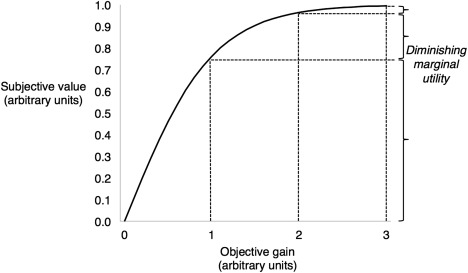Diminishing marginal utility refers to the phenomenon that each additional unit of gain leads to an ever-smaller increase in subjective value. For example, three bites of candy are better than two bites, but the twentieth bite does not add much to the experience beyond the nineteenth (and could even make it worse). This effect is so well established that it is referred to as the “law of diminishing marginal utility” in economics, and is reflected in the concave shape of most subjective utility functions. An important consequence of diminishing marginal utility is that subjective value changes most dynamically near the zero point, and quickly levels off as gains (or losses) accumulate.
